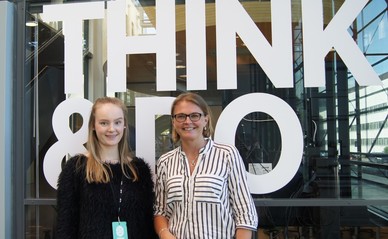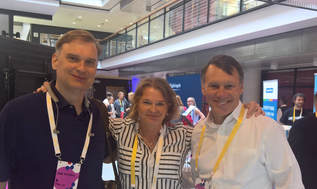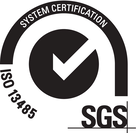 Vilja Salo has just finished her first year at the Faculty of Medicine in Helsinki University. She will spend the summer with us at Disior, on HUS medical research projects. “I never thought, that I could get to work on projects that are on the medical field, and relevant to my studies, this early. We only get to work as Junior Medical Doctors after the fourth year.”, says Vilja. So far, Vilja has been working with Maxillofacial Surgeons and Neurosurgeons, on projects that cover both facial traumas and brain tissue. “I get an inside view to what goes on in the clinics and at the OR. I will also be able to join surgeries, as a student observer, way before it would happen at school.”, Vilja explains. “This really puts the studies into perspective, gives relevance and meaning to everything I’m learning.” Relevance, meaning and purpose is also, what product development and co-creation is all about – both from the company’s and the clinic’s perspective. At Disior, we take pride in designing and building products that are meant for clinical use, and that fulfill a real, Doctor-specified need. For this, close cooperation is needed with the Medical Doctors in both clinical settings and research. “I’ve been here now for two weeks, and I have already seen a wide spectrum of potential research subjects for the future. And for my future specialty, when the time comes to choose it, this will play a role in showing, where the future of those specialties is going.”, says Vilja. “And what kind of software tools those Doctors will have in hand.” “We are grateful to have people like Vilja with us”, says Anna-Maria Henell, Disior CEO. “This is the generation of innovation, starting their studies these days. They grow to become Doctors in an environment that here in Meilahti campus literally brings together the Faculty, the clinics and the companies.” The Disior office, located in Terkko Health Hub, next door to Biomedicum and the HUS Head and Neck Center, is at the heart of the Helsinki University project, where the goal is to bring together these four key elements to enable innovation in Med Tech: the students, the clinicians, the researchers and the companies. “These students will combine the qualities of a good doctor and the capabilities of an innovator, who understand the possibilities and potential of new technology. They have learned how to play with it, even before it is a ready-made product, and can build it, combining the best of the two worlds: Med and Tech.”, says Anna-Maria.  Ilkka Kivimäki, Anna-Maria Henell and Todd Wiebusch at Upgraded Life Festival 2018 Ilkka Kivimäki, Anna-Maria Henell and Todd Wiebusch at Upgraded Life Festival 2018 Running a successful startup is all about people. Not just teams, but networks. There’s the proverbial garage, somewhere in sunny California, where success stories start… But no-one ever really succeeded working alone, garage or not. As a Med Tech startup, you need several networks: investors and business mentors for the financial side, but also for the Board room work. Medical professional for the clinical perspective. And fellow startups, scale-ups and colleagues in large companies for peer Support and networking. Last weeks have been busy with events, from Upgraded Life Festival to Arctic15, Terveydenhuollon ATK-Päivät to private networking events across the city. All of them perfect opportunities to meet people and to make things happen – for your company and for others. We are happy to have Maki.vc as our investor. Last Friday, Anna-Maria Henell was on stage at Upgraded Life Festival discussing the startup-investor relationship with Ilkka Kivimäki. If you weren’t there, here are the keys to success, according to them:
For the last point, it also nails down what was discussed at Female Leaders night last week. Organized by Helsinki Chamber of Commerce, the broader topic was Women in Tech, leadership and leading transformation. And it was all about the power of networks – whether it’s the career path, leading a startup or finding an investor. Help others and you will be helped. Share the information you have, the good contacts, and the useful experiences. The good deeds will always be returned, someway or another! |
Transforming Treatments
|
Follow our journey at:
Copyright © 2023 Disior™ Ltd. All Rights Reserved Privacy Notice License Agreement Disior™ a Paragon 28® Company |

 RSS Feed
RSS Feed

